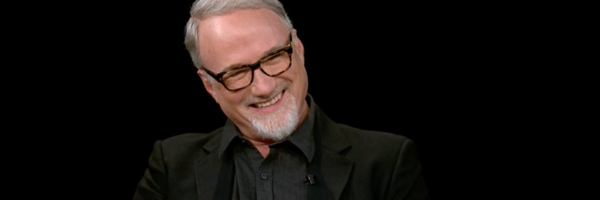Hey did you know there's a new David Fincher series dropping on Netflix this week? You'd be forgiven if you didn't. Both Netflix and the Gone Girl director have been running a surprisingly quiet campaign for the new series, Mindhunter, which follows Jonathan Groff and Holt McCallany as a pair of FBI agents who interview convicted serial killers to learn how criminals think and apply it to their investigations.
The crime series debuts on the streaming service this Friday, October 13th and in what's proving to be a rare interview for this particular project, Fincher joined McCallany and Groff on Charlie Rose this week to talk about his new series, why he keeps coming back to serial killers, and what he learned from Zodiac. You can watch the full interview below, which also features some clips from the series or check out highlights in the quotes underneath.
For Fincher, Mindhunter is an opportunity to undo the mystique of the genius, human serial killer like Hannibal Lecter or Fincher's own creation, Seven's John Doe -- characters he described as the "Wile E.Coyote supergenius." Instead, Fincher wants to get back to the idea that serial killers are real, sad people and they are very very different from your average person.
"I don't want to talk about the gourmet, you know, opera expert who -- you know, to me these are very sad people under who have, you know, grown up under horrendous circumstances. This is not -- this is not to, you know, overstate how much empathy or sympathy we should have for them but it's just simply a fact...We'd seen so much, you know, of this sort of literary conceit of, there's a very fine line separates the hunters from the hunted. And I really thought it was time to sort of take that back and make it, really, the reason that we are fascinated with them is because we're nothing like them. They are unfathomable."
Fincher also discussed learning from Zodiac just how much you can ask of an audience and why that made the serialized format perfect for a conversation-driven narrative like Mindhunters.
"I learned my lesson with Zodiac…You can ask a lot of an audience, but 2:45 minutes and no closure is probably — "Yes, get a babysitter; yes, find parking; yes, wait in line; yes, sit and have people with their phones on in your peripheral vision and concentrate for two hours and forty-five minutes," is asking a lot."
He also discussed how challenging it was to find directors comfortable with a show based on conversations instead of traditional action, explaining that they ultimately decided on a few documentarians and a writer from the Danish show Borgen.
"This is conversations. It’s very difficult when your’e an executive producer, you have to find either directors because you literally cant direct the whole thing. Ten hours, it’s too much. So in finding the other directors that we found, there are certain people that when you give them an eleven page scene that takes place at at table not unlike this and say, "Well there’s this movement in the first two pages, and then there’s this pivot." They go, “Can’t I crash something? Can’t somebody jump through the window?”
But Fincher explained why he thinks the act of conversation can be just as interesting and cinematic as flashy action sequences.
"There are acts and movements in the way that people move their agenda, and try to understand and look for clarification, and that stuff can be as interesting as people running through the streets showing their badges."

